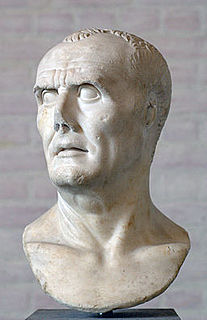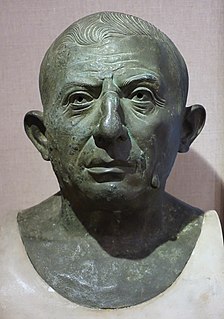Caecilia Metella (died around 80 BC) was the daughter of Lucius Caecilius Metellus Dalmaticus, Pontifex Maximus in 115 BC.
Lucius Caecilius Metellus Dalmaticus was a son of Lucius Caecilius Metellus Calvus. He was a Consul in 119 BC, and then Pontifex Maximus. He had eliminated from the Senate 32 of its members and fought Saturninus, thus contributing to the return to Rome, in 99 BC, of his brother Quintus Caecilius Metellus Numidicus. As Consul he defeated the Dalmatians, having for that deserved his cognomen and the Honours of the Triumph.
Contents
Caecilia Metella's first marriage was to Marcus Aemilius Scaurus, an aging politician at the peak of his power. Scaurus was a patrician, the princeps senatus (president of the Senate) and a traditional ally of her family. Caecilia bore Scaurus two children: Marcus Aemilius Scaurus and Aemilia Scaura, whom Sulla, her second husband, married to Pompey to forge an alliance with him. Aemilia became the second wife of Pompey. Caecilia Metella had two twins, Faustus and Fausta, and another unnamed son with Sulla.
Marcus Aemilius Scaurus was a Roman statesman who served as consul in 115 BC. He was also a long-standing princeps senatus, occupying the post from 115 until his death in 89, and as such was widely considered one of the most prestigious and influential politicians of the Late Republic.
The patricians were originally a group of ruling class families in ancient Rome. The distinction was highly significant in the Roman Kingdom, and the early Republic, but its relevance waned after the Conflict of the Orders, and by the time of the late Republic and Empire, membership in the patriciate was of only nominal significance.

The princeps senatus was the first member by precedence of the Roman Senate. Although officially out of the cursus honorum and owning no imperium, this office brought conferred prestige on the senator holding it.
Following Scaurus' death, Caecilia married Lucius Cornelius Sulla, who was fifty. In his account of the life of Sulla, Plutarch wrote that this was a prestigious marriage for Sulla due to Caecilia being the daughter of the Pontifex Maximus, the high priest of Roman state religion. The marriage was ridiculed by the people and many leading men were dissatisfied because they thought that it was unworthy of Caecilia. Caecilia was Sulla's fourth wife and he married her only a few days after divorcing Cloelia for 'barrenness'. Because of this and despite the fact that Sulla praised Cloelia and gave her gifts, many thought that he had accused her unfairly. However, he always showed Caecilia great deference. Because of this, when Sulla refused the request of the people to restore the exiled supporters of Marius (whom Sulla had fought in Sulla's First Civil War, 88–87 BC) they asked Caecilia for help. Plutarch wrote that it "was thought also that when [Sulla] took the city of Athens, he treated its people more harshly because they had scurrilously abused Metella from the walls." [1] In another passage, Plutarch specified that the scurrilous abuse against Sulla and Caecilia was from Aristion, the tyrant of Athens. [2]

Plutarch, later named, upon becoming a Roman citizen, Lucius Mestrius Plutarchus, was a Greek biographer and essayist, known primarily for his Parallel Lives and Moralia. He is classified as a Middle Platonist. Plutarch's surviving works were written in Greek, but intended for both Greek and Roman readers.

Gaius Marius was a Roman general and statesman. Victor of the Cimbric and Jugurthine wars, he held the office of consul an unprecedented seven times during his career. He was also noted for his important reforms of Roman armies. He was at the centre of a paradigmatic shift from the militia levies of the middle Republic to the professional soldiery of the late Republic; he also developed the pilum, a javelin designed to bend on impact, and large-scale changes to the logistical structure of the Roman army.

Sulla's first civil war was one of a series of civil wars in ancient Rome, between Gaius Marius and Sulla, between 88 and 87 BC. This was also the first in a succession of several internal conflicts, which eventually led to the dissolution of the Roman Republic and establishment of Julius Caesar as dictator.
While Sulla was in Greece the Marians (the supporters of Gaius Marius) seized Rome and perpetrated violence against the supporters of Sulla. Metella fled with her children with difficulty, informed Sulla that his villas had been burned and offered to help the Sullans (the supporters of Sulla) at home. [3] After Sulla celebrated his triumph for his victory in Greece, Metella bore him twin children, "[Sulla] named the male child Faustus, and the female Fausta; for the Romans call what is auspicious and joyful, "faustum." " [4] While Sulla was devoting a lavish feast in honour of the god Hercules, Caecilia was sick and dying. The priests forbade Sulla 'to go near her or to have his house polluted by her funeral.' Sulla divorced her and had her taken to another house while she was still alive. In this way he respected the law. Sulla transgressed his laws limiting the expenses of funerals and of banquets, organised a sumptuous funeral and drowned his sorrows in drinking parties and extravagant banquets. [5] Plutarch mentioned that another, unnamed son who died shortly before the death of his mother Metella appeared to him in a dream. Plutarch clarified this by saying that when Sulla died he left two young children by Metella. [6]




